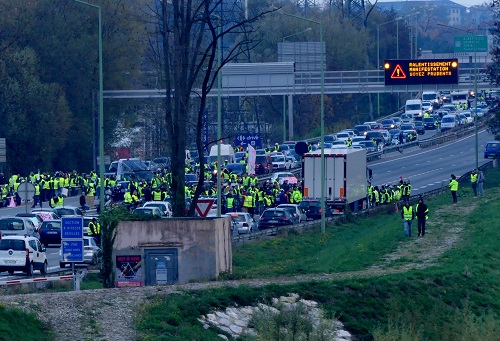
As satiated Americans gathered around their Thanksgiving tables to count their blessings, incensed protesters gathered in roadways and intersections across France to count the cost of Emmanuel Macron’s punishing gas taxes. A leaderless rebellion propelled hundreds of thousands of people into the streets – on foot, of course – and made France perhaps the least likely site in the world to see citizens demand, “Death to taxes.”
That was one of the phrases emblazoned on placards held aloft by the “gilets jaunes” movement (named for the yellow vests French drivers must wear in the event of a breakdown).
The protests, expected to last one day, have endured a week. On November 17, 244,000 protesters erected 2,000 roadblocks nationwide. Estimates of protesters from the following Saturday range from 81,000 to 106,000 – including 8,000 protesters on the Champ-Elysees alone.
When a few miscreants turned the protests violent, police responded with tear gas. Meanwhile, politicians from every opposition party hurried to claim ownership ofthe grassroots movement that voices an authentic national consensus: The government’s excessive taxes on gasoline and diesel are hurting families.
A problem of its own making
Like its neighbors, the French government once used taxes and incentives to “nudge” the French to ditch gasoline for diesel. Diesel, scientists said, emits less carbon dioxide than gasoline. The incentives worked, and by 2013, two-thirds of all new cars on French roadways had diesel engines.
But then the governments of Europe learned that, while diesel emits less CO2, it releases far higher levels of other particulates. Now the government is correcting a problem of its own making by taxing both diesel and gasoline. Last year, President Macron announced the government plans to end the sale of gasoline and diesel vehicles by 2040.
Meanwhile, he ratcheted up the economic pain. Gasoline costs as much as $7.06 a gallon (€1.64 a liter) in Paris. Diesel prices are being taxed into near parity. The government assesses that taxes account for 60 percent of the overall cost of fuel.
Carbon taxes continue to pile up with no end in sight. The New York Times reports, “the tax burden had grown by about €25 billion every year between 2002 and 2017.” Taxes increased this year, and the government plans to hike fuel taxes again early next year (by an additional 6.5 cents a liter for diesel and 2.9 cents a liter for gasoline).
Authorities hope the move will force the French to reduce their carbon footprint and switch from diesel, yesterday’s preferred purchase, to electric and hybrid cars. Instead, the people have gone public with their tales of pain and outrage:
- A father of seven who makes €1,500 a month said he’s “sick of being taxed on everything”;
- A contractor who has to drive large distances for his business said, “It seems like to us that the government is only working to maintain its own privileges … Why should we have to finance their projects?”
- A 21-year-old woman said, “They take everything from us. They steal everything from us”; and
- 860,000 people signed a petition on Change.org to reduce the gasoline tax.
Even far-Left radical Jean-Luc Melenchon has said, “When tax is no longer agreed to, it’s the start of revolutions in France.”
No one can doubt the potency of this populist revolt, least of all Macron, whose approval ratings have dipped into the 20s. How has his government responded?
Let them eat electric cars
Macron this week said the protests created “a moral crisis” of “ambient demagogy.” At times, he’s conflated the undeniably grassroots movement with a small fraction of extremists who joined in the protests. He vacillated between affirming the protesters’ pain and denouncing them as “thugs” who “want to destroy and create disorder.”
But on the substance of their complaint, he refuses to budge. “We must not change course, because the policy direction is right and necessary,” Macron said.
He instead promised to dispatch his environmental minister to meet with the protesters. And he pledged enhanced tax incentives to purchase new electric cars.
“We can’t buy food at the end of the month but we’re going to buy an electric car?” asked an understandably piqued 45-year-old woman.
Macron’s moral morass
This is, indeed, a moral crisis. The power of the government has been harnessed to “nudge” an unwilling populace toward goals set by the political leadership. The tax burden imposed by the government has been so severe that an increasing number of families cannot care for their other legitimate needs. To add insult to injury, the French free-market think tank Fondation iFRAP reports that France already has one of the lowest levels of C02 emissions of any industrialized nation – and much of the carbon tax goes to the government’s general fund, not to alternative energy initiatives.
Moreover, the nation’s political leadership refuses to listen to the voice of the governed who are pleading for relief.
Oppressive taxes inhibit human flourishing. And unpopular elitists disregarding the pleas of their suffering people in order to fatten government coffers could drive a wedge in French society that explodes in perilous ways.
The biblical story of Rehoboam shows how excessively harsh taxation can divide a people. French history provides its own example of a monarch who cruelly ignored the plight of starving people. That story, too, ended badly.
A free market allows people to pursue their own ends, according to their own values. The French people’s already-light carbon footprint attests to the value they place on the environment. But humane economics values those people, their families, above all.
(Photo credit: Florian Pépellin. This photo has been cropped. CC BY-SA 4.0.)

